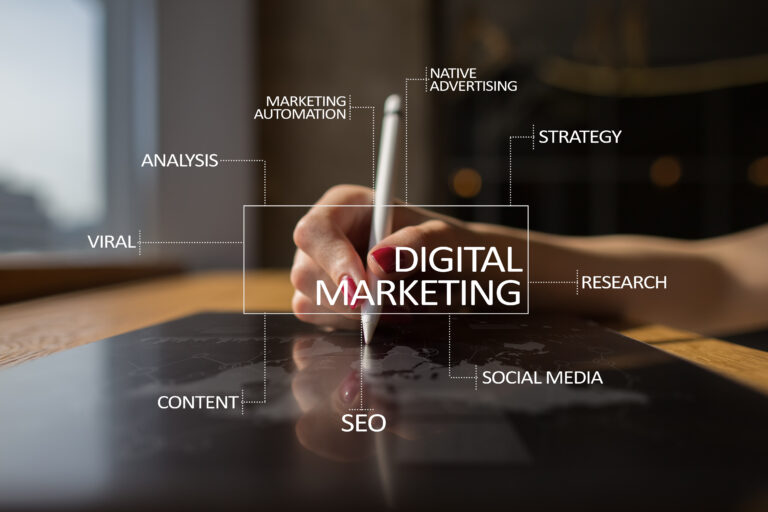In today’s increasingly digital world, the importance of digital marketing cannot be overstated. With the rapid advancements in technology, businesses must adapt to stay relevant and competitive. Traditional marketing strategies are no longer enough to reach and engage with customers effectively. This article aims to explore the concept of digital marketing, its role in business, key components, impact on business growth, and the challenges it presents.
Understanding the Concept of Digital Marketing
In today’s digital age, businesses are constantly seeking innovative ways to reach and engage their target audience. One of the most effective strategies that has emerged is digital marketing. This powerful tool encompasses a wide range of techniques and strategies that businesses use to promote their products or services through electronic media.
Defining Digital Marketing
Digital marketing goes beyond traditional marketing methods by leveraging various digital channels to connect with potential customers. These channels include search engines, social media platforms, email marketing, content marketing, and more. By utilizing these channels, businesses can create personalized and interactive experiences for their target audience.
For instance, search engine optimization (SEO) plays a crucial role in digital marketing. By optimizing their websites for search engines, businesses can improve their online visibility and attract organic traffic. Social media marketing, on the other hand, allows businesses to connect with their audience on platforms like Facebook, Instagram, and Twitter, fostering brand loyalty and driving conversions.
The Evolution of Digital Marketing
Over the years, digital marketing has undergone significant transformations. It has evolved from simple banner ads to complex multi-channel campaigns that integrate various digital platforms. This evolution has been driven by advancements in technology and the changing preferences of consumers.
With the advent of data analytics and insights, businesses now have access to valuable information that helps them make informed marketing decisions. By analyzing user behavior and preferences, businesses can tailor their marketing strategies to better meet the needs of their target audience. This data-driven approach has revolutionized the way businesses approach marketing, allowing them to optimize their campaigns for maximum effectiveness.
Furthermore, the rise of smartphones and social media platforms has had a profound impact on digital marketing. Mobile marketing has become an integral part of any digital marketing strategy, as more and more people rely on their smartphones for browsing the internet and accessing social media. This has opened up new avenues for businesses to connect with their customers, allowing them to deliver targeted messages and offers directly to their mobile devices.
In conclusion, digital marketing is a dynamic and ever-evolving field that offers businesses endless opportunities to connect with their target audience. By leveraging the power of digital channels and embracing technological advancements, businesses can stay ahead of the competition and drive growth in today’s digital landscape.
The Role of Digital Marketing in Business
The digital age has revolutionized the way businesses operate, and one of the key elements driving this transformation is digital marketing. With the power of the internet, businesses now have the opportunity to reach a global audience and connect with customers in ways that were unimaginable in the past.
Enhancing Business Visibility
One of the primary goals of digital marketing is to enhance business visibility in the online realm. In today’s highly competitive marketplace, simply having a website is not enough. Businesses need to ensure that their online presence is easily discoverable by potential customers. This is where search engine optimization (SEO) techniques come into play.
SEO involves optimizing a website’s content, structure, and design to rank higher in search engine results pages. By implementing relevant keywords, creating high-quality content, and improving the website’s user experience, businesses can increase their chances of appearing at the top of search engine results. This increased visibility not only drives more organic traffic to the website but also enhances brand recognition and credibility.
Furthermore, digital marketing strategies such as pay-per-click (PPC) advertising and social media advertising can also contribute to enhancing business visibility. These methods allow businesses to target specific demographics and display their ads to potential customers who are more likely to be interested in their products or services.
Customer Engagement and Retention
While attracting new customers is important, retaining existing customers is equally crucial for long-term business success. Digital marketing offers various tools and platforms that enable businesses to engage with their customers on a more personal level.
Social media platforms have become a powerful tool for customer engagement. Businesses can create profiles on popular platforms such as Facebook, Instagram, and Twitter to interact with their customers directly. This allows businesses to address customer queries, provide real-time support, and build relationships with their target audience. By actively engaging with customers on social media, businesses can foster a sense of community and loyalty among their customer base.
In addition to social media, email marketing is another effective way to stay connected with customers. By collecting email addresses from website visitors or customers, businesses can send regular updates, exclusive offers, and personalized recommendations. This direct communication channel helps businesses nurture relationships with their customers and encourages repeat business.
Moreover, digital marketing allows businesses to gather valuable data and insights about their customers. By analyzing customer behavior, preferences, and purchasing patterns, businesses can tailor their marketing strategies to better meet customer needs and expectations. This data-driven approach not only enhances customer engagement but also improves overall business performance.
In conclusion, digital marketing plays a crucial role in enhancing business visibility and customer engagement. By utilizing SEO techniques, businesses can improve their online presence and attract more potential customers. Through social media and email marketing, businesses can engage with their customers on a personal level, fostering loyalty and repeat business. In this digital age, embracing digital marketing is essential for businesses looking to thrive and succeed in the highly competitive marketplace.
Key Components of Digital Marketing
Digital marketing is a multifaceted approach that encompasses various strategies and techniques to promote businesses, products, and services online. It involves utilizing digital channels such as search engines, social media platforms, and content creation to reach and engage with the target audience. Let’s explore some of the key components of digital marketing in more detail:
Search Engine Optimization (SEO)
SEO plays a crucial role in digital marketing. It involves optimizing a website’s content, structure, and design to improve its visibility in search engine results pages. By utilizing relevant keywords, creating quality content, and building authoritative backlinks, businesses can increase their organic search traffic and attract potential customers.
When it comes to SEO, it’s not just about stuffing keywords into the content. It’s about understanding the intent behind the search queries and providing valuable information that satisfies the user’s needs. This involves conducting thorough keyword research, analyzing competitors, and implementing on-page and off-page optimization techniques.
Furthermore, SEO is an ongoing process that requires constant monitoring and adaptation. Search engine algorithms are constantly evolving, and businesses need to stay up-to-date with the latest trends and best practices to maintain their search engine rankings.
Social Media Marketing
Social media platforms have revolutionized the way businesses connect with their target audience. Through social media marketing, businesses can create engaging content, interact with customers, and build a strong brand presence. Social media platforms provide businesses with an opportunity to reach a wider audience and build brand awareness.
When implementing social media marketing strategies, businesses need to identify the platforms that their target audience frequents the most. This could be Facebook, Instagram, Twitter, LinkedIn, or any other platform that aligns with their target demographic. By understanding the preferences and behaviors of their audience, businesses can tailor their content and messaging to effectively engage with them.
Additionally, social media marketing involves more than just posting content. It requires active community management, responding to comments and messages, and leveraging social media advertising to reach a larger audience. By building meaningful relationships with their followers, businesses can foster brand loyalty and advocacy.
Content Marketing
Content marketing revolves around creating valuable and relevant content to attract and engage customers. By providing informative blog posts, videos, infographics, and other forms of content, businesses can establish themselves as thought leaders in their industry. Content marketing helps drive organic traffic, generate leads, and nurture customer relationships.
Creating high-quality content involves understanding the target audience’s pain points, interests, and preferences. By conducting thorough research and analysis, businesses can develop content that addresses their audience’s needs and provides them with valuable insights. This can include educational articles, how-to guides, case studies, and much more.
Furthermore, content marketing goes beyond just creating content. It involves effective distribution and promotion to ensure that the content reaches the intended audience. This can be done through various channels such as social media, email marketing, influencer collaborations, and search engine optimization.
By consistently delivering valuable content, businesses can establish themselves as trusted sources of information and build long-term relationships with their audience.
The Impact of Digital Marketing on Business Growth
When it comes to business growth, digital marketing plays a crucial role in driving success. With its ability to reach a wider audience and engage with customers, digital marketing has a direct impact on a business’s bottom line. But what exactly are the ways in which digital marketing influences business growth? Let’s explore further.
Increased Sales and Revenue
One of the most significant impacts of digital marketing on business growth is the increase in sales and revenue. By leveraging various digital marketing strategies, businesses can effectively target their desired audience and convert them into paying customers. The targeted nature of digital marketing allows businesses to focus their efforts on customers who are more likely to convert, resulting in higher conversion rates and ultimately boosting sales and revenue.
Moreover, digital marketing provides businesses with valuable data and insights about their customers’ behavior and preferences. By analyzing this data, businesses can optimize their marketing campaigns and tailor their offerings to meet the specific needs and desires of their target audience. This personalized approach not only enhances the customer experience but also increases the chances of making a sale.
Building Brand Reputation
Another significant impact of digital marketing on business growth is its ability to build and enhance brand reputation. In today’s digital age, a strong brand reputation is vital for business success. Digital marketing allows businesses to create valuable and engaging content that resonates with their target audience, thereby establishing themselves as industry leaders and experts.
Furthermore, digital marketing enables businesses to interact and engage with their customers directly. Through social media platforms, businesses can respond to customer inquiries, address concerns, and provide exceptional customer service. Positive online reviews, social media mentions, and customer testimonials all contribute to a favorable brand image, attracting more customers and fostering trust and loyalty.
Additionally, digital marketing allows businesses to showcase their unique selling propositions and highlight their competitive advantages. By effectively communicating their brand values and differentiators, businesses can differentiate themselves from competitors and establish a strong brand identity in the minds of their target audience.
In conclusion, digital marketing has a profound impact on business growth. Through increased sales and revenue as well as building a strong brand reputation, businesses can leverage digital marketing strategies to drive success and achieve their growth objectives. Embracing digital marketing is no longer an option but a necessity for businesses looking to thrive in today’s highly competitive marketplace.
Overcoming Challenges in Digital Marketing
Staying Updated with Market Trends
The digital marketing landscape is constantly evolving. To stay competitive, businesses must stay updated with the latest market trends, emerging technologies, and consumer behaviors. Investing in continuous education and keeping a pulse on industry news allows businesses to adapt their digital marketing strategies to remain relevant and effective.
Dealing with Data Privacy and Security Issues
Data privacy and security are significant concerns in the digital age. Businesses must handle customer data responsibly to maintain trust and comply with regulations. Implementing secure data storage measures, obtaining appropriate consents, and being transparent about data usage are crucial for maintaining customer confidence and mitigating potential risks.
In conclusion, digital marketing has become an essential strategy for businesses in the modern business era. It allows businesses to enhance their visibility, engage with customers, and drive growth. By embracing key components such as SEO, social media marketing, and content marketing, businesses can reach their target audience effectively and build a strong brand reputation. However, as with any marketing strategy, businesses must overcome challenges and stay updated with emerging trends to maximize the potential of digital marketing in driving success in today’s digital landscape.





